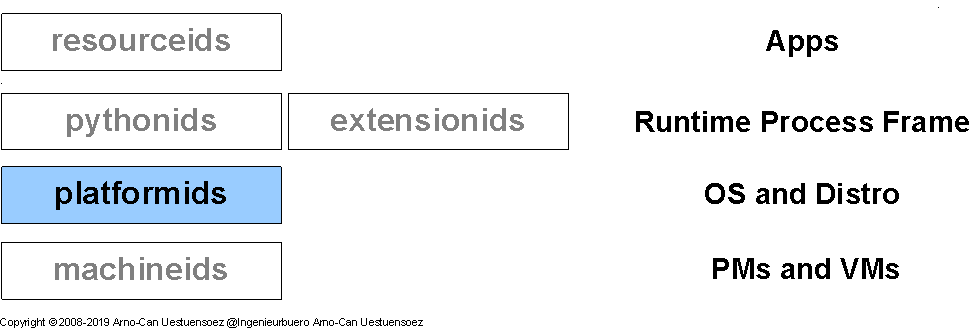1. Abstract¶
Modern landscapes of information infrastructures are commonly designed and organized as stacks of runtime service environments. The technical architecture of the service stacks consists of a wide range of heterogenous landscapes of components frequently requiring adaptation and mediation.
This requires commonly the integration by wrappers and add-on coding for various operating systems and their specific distribution releases. The platformids provides the automated technical detection and enumeration of a comprehensive list of standard OS and distribution, e.g. ‘Linux’, ‘BSD’, ‘Unix’, ‘OS-X’, and ‘Windows’. For first details refer to the Blueprint.
The provided components comprise:
- Platform as 32bit Integer Bit-Mask
The core module platformids provides the functions and constant(var) definitions for the encoding and decoding of the complete distribution information into bitmasks. [doc]
- Platform as Python Class
The platformids.platforms module provides the class representation.
- Standard Platform Plugins
The submodules provides OS and distribution specific data definitions and adapter interfaces.
platformids.dist [standard] / [net+security]
platformids.embed [IoT]
- Custom Platform Plugins
The custom submodules provide less often used OS and distribution data as custom modules, serving also as pattern and templates for individual extensions.
platformids.custom [custom]
For tested standard OS and distributions see help on installation / Tested OS and Python Implementations. For other stack layers refer to [machineids], [pythonids], [resourceids], and [extensionids].
Concepts and enumeration values are migrated from the
UnifiedSessionsManager (C) 2008 Arno-Can Uestuensoez @Ingenieurbuero Arno-Can Uestuensoez [UnifiedSessionsManager]

